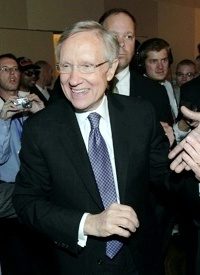
In an effort to stimulate the economy by fostering a positive environment for small business owners, Republicans have been steadfast about extending Bush’s tax cuts for every American, including those with an income of over $250,000. Democrat Senate Majority Leader Harry Reid, however, fresh off his own hard-fought reelection, indicates his unwillingness to bend on the Bush tax cuts, explaining that he wishes to see them extended only for those families earning less than $250,000.
In an effort to demonize Republicans by making them appear insensitive to the plight of the middle-class family, Reid told reporters at a conference with his caucus: “The one thing that we are focused on like a laser is that we are going to cut taxes for the middle class. Now, I would hope that the Republicans will not block that.”
Fox News comments, “But the Republicans have repeatedly said that is not good enough and have introduced legislation to make all of the tax cuts permanent, saying a recession is no time in which to raise taxes.”
The Democrats have time and again insisted upon lowering the tax rates only on individuals earning less than $200,000 or couples earning less than $250,000, while allowing the tax cuts to expire for those making above those amounts. The Republicans, on the other hand, contend that raising taxes on higher earners would hurt those who create jobs through businesses they control.
The Republican position was reiterated by likely House Speaker John Boehner on Wednesday.
Seemingly unfazed by the Democratic losses on Tuesday, Reid seemed to slam the door on making all of the tax cuts permanent:
We are not ostriches with our head in the sand someplace. We’re willing to pull our head out and look around if they have some better ideas. But I think that the legislation introduced by my counterpart, Mitch McConnell, where you extend everything indefinitely, that’s a road to a $4 trillion addition to the debt that we have, and that won’t happen.
Reid’s assertions seemed to mirror those indicated by the President during his public address Wednesday afternoon. Though Obama called the results of Tuesday’s elections a “shellacking” for the Democratic Party, he indicated only a slight willingness to compromise on the tax cuts:
My goal is to make sure that we don’t have a huge spike in taxes for middle-class families. Not only would that be a terrible burden on families who are already going through tough times, it would be bad for our economy. It is very important that we’re not taking a whole bunch of money out of the system from people who are most likely to spend that money on, you know, goods, services, groceries — you know, buying a new winter coat for the kids.
As noted by Fox News, however, “Reid’s job is now more difficult as he heads into a lame duck session in mid-November with three new members in the chamber, all of whom have said the tax cuts should be at least extended temporarily.”
One senior Democratic aide remarked, “Nothing has been decided. The only thing that everyone agrees on is to extend the tax cuts for the middle class. What, if anything else, will be done will be subject to negotiations with the Republicans." He added that the tax cuts debate is only “likely” during the lame duck session, “but next steps must still be discussed.”
Reid claimed the next move is up to the Republicans:
Republicans must take responsibility to solve the problems of ordinary Americans. No is not the answer. It has to be yes — not our yes, but a combined yes, a consensus yes. The ball is in their court. We have made the message very clear that we’re willing to work with Republicans.
He warned, “The American people can see that like a very, very slow curveball — and they will feel like that’s what they’ve been dealt if Republicans are unwilling to work with us.”
President Obama has said that he will meet with bipartisan congressional leadership “sometime in the next few weeks and see where we can move forward.”
Nasdaq notes, “If no action is taken, the so-called Bush tax cuts will expire at the end of the year, and income taxes as well as taxes paid on dividends and capital gains, will increase from January.”
Photo: Sen. Harry Reid, D-Nev., greets supporters at the Nevada State Democratic election night party after Reid defeated Sharron Angle to win re-election, Nov. 2, 2010, in Las Vegas: AP Images




